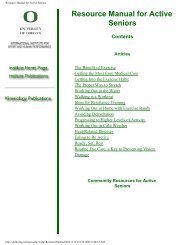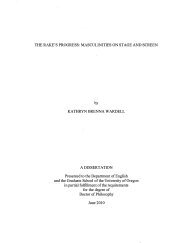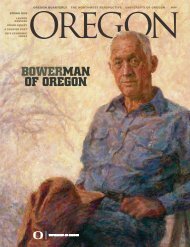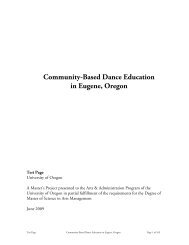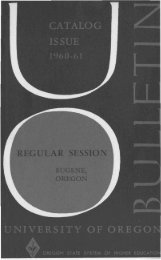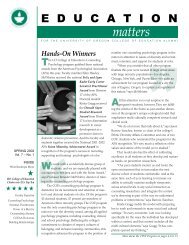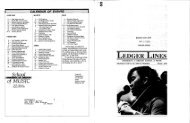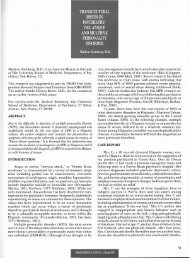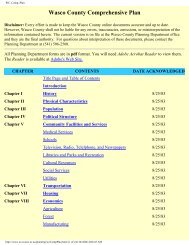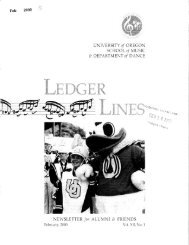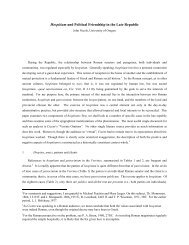~EGULAR SESSION - University of Oregon
~EGULAR SESSION - University of Oregon
~EGULAR SESSION - University of Oregon
Create successful ePaper yourself
Turn your PDF publications into a flip-book with our unique Google optimized e-Paper software.
214 COLLEGE OF LIBERAL ARTS<br />
The doctoral candidate's dissertation must embody the results <strong>of</strong> research<br />
and show evidence <strong>of</strong> originality and ability in independent investigation. It is<br />
recommended that work on the dissertation be begun early in the doctoral program,<br />
so that the candidate's research experience will be an integral part <strong>of</strong> his<br />
total program <strong>of</strong> study.<br />
A brochure describing the graduate program in sociology in more detail and<br />
specifying the materials that must be submitted with applications for admission<br />
may be obtained from the <strong>of</strong>fice <strong>of</strong> the department. All application material must<br />
be submitted at least two months before the student plans to begin graduate work;<br />
students wishing to apply for graduate assistantships must submit these materials<br />
by March 1.<br />
LOWER·DIVISION COURSES<br />
Soc 204, 205, 206. General Sociology. 3 hours each term.<br />
Introduction to the sociological perspective; basic findings regarding the<br />
development, structure, and function <strong>of</strong> human groups and societies, with<br />
emphasis on the descriptive comparison <strong>of</strong> modern complex societies.<br />
UPPER-DIVISION COURSES<br />
SOC 300. Principles <strong>of</strong> Sociology. 3 hours.<br />
Fundamental concepts and empirical findings in the field <strong>of</strong> sociology. Not<br />
open to students who have completed Soc 204, 205.<br />
Soc 301. American Society. 3 hours.<br />
An analysis <strong>of</strong> American society in terms <strong>of</strong> its significant structural traits<br />
and their functions; major changes in American society and selected contemporary<br />
problems examined in their relation to institutional structures.<br />
Not open to students who have completed Soc 204,205. Prerequisite: Soc 300.<br />
Soc 303. World Population and Social Structure. 3 hours.<br />
Introduction to population studies, providing within a sociological framework<br />
an analysis <strong>of</strong> historical, contemporary, and anticipated population conditions<br />
and trends, as these are related to social situations and the organization <strong>of</strong><br />
society. Prerequisite: Soc 204, 205, 206 or Soc 300. Jitodai, Martin.<br />
Soc 304. The Community. 3 hours.<br />
Analysis <strong>of</strong> the structure and organization <strong>of</strong> human communities. Prerequisite:<br />
Soc 204, 205, 206 or Soc 300. Jitodai.<br />
Soc 305. Contemporary Social Problems. 3 hours.<br />
Introduction to problems associated with the organization <strong>of</strong> social systems;<br />
deviant behavior and methods <strong>of</strong> social control. Prerequisite: Soc 204, 205,<br />
206 or Soc 300.<br />
Soc 311. Introduction to Social Research. 3 hours.<br />
The development <strong>of</strong> social research; the nature <strong>of</strong> scientific inquiry and basic<br />
methods and techniques; examination <strong>of</strong> representative sociological studies<br />
from the standpoint <strong>of</strong> methodology. Prerequisite: Soc 204, 205, 206 or consent<br />
<strong>of</strong> instructor. Polk.<br />
Soc 334, 335. Social Psychology. 3 hours each term.<br />
Analysis <strong>of</strong> psychological processes in relation to social situations. How languages,<br />
perception, learning, thinking, motivation, and attitudes determine<br />
and result from social interaction and group processes. Prerequisite: Soc 204,<br />
205 or Psy 201, 202. Berreman, Hyman, Wrench.<br />
Soc 338. Marriage and the Family. 3 hours.<br />
The growth and development <strong>of</strong> the husband-wife relationship throughout<br />
the family life cycle. Special emphasis on the period from engagement through<br />
the birth <strong>of</strong> the first child. Prerequisite: Soc 204, 205; or Psy 201, 202; or<br />
consent <strong>of</strong> instructor. J ohannis, Rodgers.



